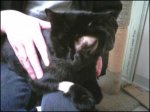My Bear Man was blind from birth. Cindy and Mousie asked me to reprint some advice I posted on Facebook for a friend. I have copied and pasted it here, so please forgive me if it seems to be targeted towards a new kitten.
Bless you for taking care of this sweet angel. I adopted Bear as a one year old, so I didn't have him (unfortunately) from kittenhood. When Bear was at the shelter, he was so good at compensating that it took a while for anyone to realize he was blind. I found the same thing once I got him home. You would have to really watch him to realize he was blind. I would want to have him looked at by a veterinary opthalmologist when you get a chance. Bear's blindness was a birth defect caused by (as best they can tell) his mother having Panleukopenia when she was pregnant with her kittens.
I would start this kitten off in a small room (like a bathroom) and let him gradually increase his range under supervision. You want to protect him from falling from furniture until he is used to the house. Bear would use the kitchen chairs to climb up onto the kitchen table, and then he would be trapped up there, as he couldn't find his way down. Once your kitty is big enough, he will be able to go up and down stairs, beds, sofas, etc with no problem. The plush furniture has a little something they can grip onto, to break their fall. It's harder to jump off the hard surfaces.
Once he has the run of the house, don't move the furniture around! You have to be aware of doing things like putting the laundry basket at the foot of the stairs, or leaving packages lying in the hallway. Kitty will have a mental map of the layout of the house. Oh, and make sure you keep the toilet lids down. Bear liked to hop up on the toilet seat to grab a Kleenex to eat, but he got wet a couple of times.
Play with toys that make noise, like something he can hear dragging on the floor, or something that makes a noise when you toss it and it lands. Bear was so good that he could hear a pompom toy land on the floor, and pounce and land on it.
When you put something down, like a dish for him, tap the floor or your dish with your fingernails to make a sound so he can find it. Talk to him as you move around a room, so he knows where you are. I would make a tsk tsk noise for Bear that he knew meant to follow me. Talk to him as you approach him, so as not to startle him when you touch him. Brush your hand against his fur gently before you touch him or pick him up, so he knows you are about to touch him. Bear can feel air currents against his fur and whiskers, so he knows when his face is about to be touched.
Bear navigates an unknown space by walking along the walls or furniture. Once he knows where he is, he has no problem walking across the middle of a room. Kitty will bonk into things, however. That's unavoidable. Bear stumbles across a change in surface texture, such as crossing from a tile surface onto carpet. Kitty will get to know where these boundaries are, and use them to navigate.
Avoid loud music or TV in the room where he is. It confuses him. Have some "grounding spots". I have Bear's bed, a familiar stairway, etc, so that when I just put him down from being picked up, he can immediately sense where he is and find his way from there on his mental map.
Keep some big pillows or bolsters around the outside of your bed until you are confident he can find his way down. Don't let him outside, obviously. Let the vet and all vet staff know he is blind, so they don't walk away and leave him on a table where he can fall off...
I would sometimes walk shuffling my feet so he could follow my steps, just rub my fingers together to make a light sound for him to follow, and always, always, talk to him. Keep things (dishes, bed, litter) in the same place all the time.
I also taught Bear the word "Careful!", spoken in a sharp tone. It meant he was about to fall off something or walk into something or someone (i.e. Emily). He knew to stop walking when he heard that command.



